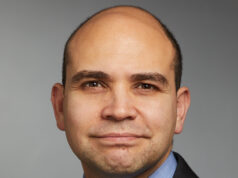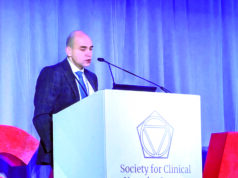
Manj Gohel, Stephen Black and Alun Davies consider the impact of the COVID-19 pandemic on patients with venous disease. They conclude: “Once the acute crisis has passed, we must work hard as a community to avoid the population of patients with venous disease from becoming a ‘second wave’ of victims.”
The world seems a very different place to only a few short weeks ago. The COVID-19 pandemic has paralysed society across the globe and while the full extent of the impact remains unclear at this early stage, the care of patients with venous disease is unlikely to return to normal for many months, if not years. Unsurprisingly, the focus of health professionals and hospitals has been diverted to the immediate management of patients with complications of coronavirus and non-urgent (and often urgent) medical care has been postponed. Even healthcare professionals and facilities not directly involved in COVID-19 care, have been unable to continue treating patients with venous disease due to social distancing and self-isolation advice, as well as a widespread public desire to avoid hospitals and clinics. What does all this mean for our patients with venous disease?
Firstly, aggressive thrombus removal for patients with acute deep vein thrombosis may be possible only for a small number of severe patients, or not be possible at all. The additional risks of virus transmission (either to patients, or healthcare staff) will need to be added to already complex decision making process. If interventions are considered, those which offer single-stage thrombus removal are likely to be preferable, avoiding protracted hospital stays. The importance of non-surgical management outside the hospital is elevated in these circumstances. Effective anticoagulation is imperative. However, early compression therapy, which can be delivered via community healthcare services can significantly reduce rates of post-thrombotic syndrome and should be a mainstay of care.
The greatest impact of the current crisis is likely to be on the large numbers of patients with chronic venous disease, requiring usually superficial, but also deep venous interventions. The chronic nature of these conditions means that these will be among the first to be cancelled, but unfortunately, this also exacerbates the long-standing perception that these conditions are not important. The risks of COVID-19 appear to be greatest in the elderly, comorbid population that is often affected by chronic venous disease. Therefore, in the short-term, interventions may need to be reserved only for the most urgent cases (bleeding varicose veins for example) and performed in non-COVID facilities if possible. It is also imperative that patients are not ‘lost’ at a time when hospital systems and administrators are under enormous strain. In the medium and long-term, the effect of the current crisis on commissioning and referral pathways is likely to persist beyond the acute crisis. Perhaps an even bigger effect will be a reluctance of patients to seek medical help for their venous disorders. While this is clearly a retrograde step, we have been here before and by focussing on the evidence base and enormous quality of life improvements that venous interventions can deliver, we can strive towards ‘gold-standard’ care.
Even in adversity, there may be opportunities. The use of remote, or telemedicine has not been widely used for venous care. Most venous specialists would agree that a photograph of the leg, along with clinic history is often enough to make a confident diagnosis and offer important advice and reassurance to the patient, prior to face-to-face assessment and intervention. The enforced use of remote healthcare may highlight an important new tool for reaching a wider population of patients in the future. Efforts should be made to monitor outcomes in the cohort of patients with enforced, non-operative management. These are the natural history studies that may never otherwise be feasible, or ethical. There are also important avenues for research in patients with COVID-19, in particular the associated development of hypercoagulability and disseminated intravascular coagulation.
Clearly, the current focus must be on the immediate care of patients with coronavirus, and protection of the population at large. Many venous specialists will have been redeployed to frontline roles in this battle. Once the acute crisis has passed, we must work hard as a community to avoid the population of patients with venous disease from becoming a ‘second wave’ of victims. In the next few weeks and months, many of us will encounter the most challenging professional and personal times of our lives. We should remember the importance of personal wellbeing and civility. We wish you and your families all the best, as we stand together to face the challenges of the next few months, and beyond.
Manj Gohel is a consultant vascular and endovascular surgeon at Cambridge University Hospitals, Cambridge, UK.
Stephen Black is a consultant vascular surgeon at Guy’s and St Thomas’ NHS Foundation Trust, London, UK.
Alun H Davies is a professor of vascular surgery and head of section of vascular surgery at Imperial College London, UK, and consultant surgeon at Imperial College NHS Trust, Charing Cross Hospital and St Mary’s Hospital, London, UK.












